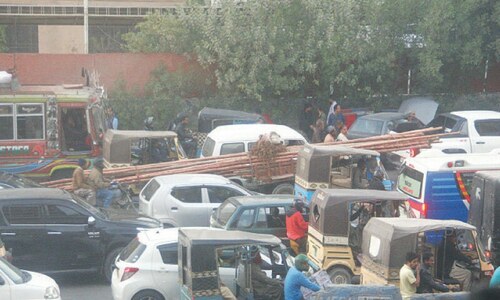KARACHI, Jan 4: KESC consumers fed up with prolonged bouts of load-shedding and rising tariffs may turn to alternative power sources to help ease woes as several small contractors in the city are providing small-to-medium scale solar and wind power projects for use in homes and businesses.
There are several small wind and solar power projects already in place in Karachi, but experts believe the widespread adoption of this technology is being held up by the fact that consumers are daunted by the relatively high initial costs of setting up the systems.
The fact that the technology has also not been widely publicised as an alternative to using generators, UPS (uninterrupted power supply), or even the power utility’s supply has also led to the lack of awareness regarding renewable energy sources.
Several small contractors (notably in the electronics market and Gizri area) are willing to design and implement renewable energy projects, but consumers have so far not widely adopted the technology.
“In order for the country to deal with this power crisis, it is essential that households adopt renewable energy generation: it is the only way to deal with the issue,” says Azhar Ayub, CEO of Energen, a Nazimabad-based company that designs and sells renewable energy systems.
Process easier than believed
While the idea of setting up a solar- or wind-powered electricity generation system in one’s home may sound daunting, the actual implementation of these schemes is not very difficult. Both rely on the same basic concepts: a solar panel or wind turbine generates electricity that is fed into a battery through a device called a charge controller. The battery stores the energy, which is converted into usable alternating current by an inverter.
The only difference between these systems and a traditional UPS device is that UPS batteries are charged by the KESC supply, while these batteries are charged by the solar panels or wind turbine.
The parts for these systems are usually imported from China, and can be procured through dealers across the metropolis. An internet search for dealers in wind and solar power systems yielded over 80 results for all of Pakistan, with at least 15 dealers based in Karachi.
Prices for these systems vary, but a 1.25kW solar generation system can be obtained for between Rs120,000 and Rs250,000, depending on the dealer being selected. A 1.25kW system will generate enough power to supply two fans and two or three tube lights, in addition to a television.
A similar wind-powered system will cost Rs100,000 and above, plus between Rs4,000 and Rs5,000 as installation charges.
Larger systems can be installed, and prices will increase accordingly. Solar panels in particular lend themselves to expansion, as one simply needs to add more panels and higher-rated invertors, charge controllers and batteries to the system, if required.
Strengths and weaknesses
Karachi, being on the coast and near the equator, is ideally suited for both wind and solar power generation. “The solar panel will receive between seven and eight hours of useful direct solar radiation per day, while windmills mounted on roofs can take advantage of the sea breeze,” according to Mr Ayub, who is currently pursuing a PhD in renewable energy systems.
Both systems, unlike generators and UPS, are continuously generating, which means that they do not have to be back ups: they run all the time. Neither needs any fuel, and they do not create any pollution.
Further, solar power systems have next to no running costs once installed: they only need to be cleaned from time to time. The deep cycle batteries will also provide three days worth of power, even if the solar panel has not been exposed to much sunlight. Wind power systems, however, are more variable, as they depend on the prevalence of the breeze to generate power. Also, because there are moving parts in the wind turbine, wind systems are more prone to maintenance issues as compared to solar systems, according to Mr Ayub.
Solar systems, meanwhile, are expensive to initially set up.
Financing options
“The only way these systems can be successful in a widespread manner,” says Mr Ayub, “is if the banks or government provide some sort of long-term financing to make covering the initial cost for average consumers easier.”
He points out that such schemes have been implemented in other countries, where solar and wind systems are in place, such as China, India and Brazil. However, he complains that the government is simply not serious about helping the renewable energy sector. The Alternative Energy Development Board, under whose purview the matter falls, is currently pursuing several solar and wind power projects, but each of these tends to be large-scale, and not tailored to help dealers who are providing individual home/business solutions.
So far, then, the relatively high initial cost of setting up the solar and wind systems seems to have driven away potential consumers, even though the technology exists to free them, at least in part, from the vagaries of the KESC’s supply.













































Dear visitor, the comments section is undergoing an overhaul and will return soon.